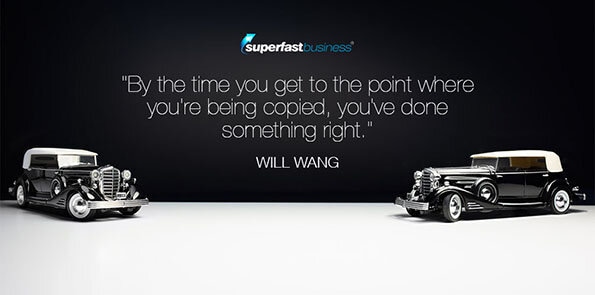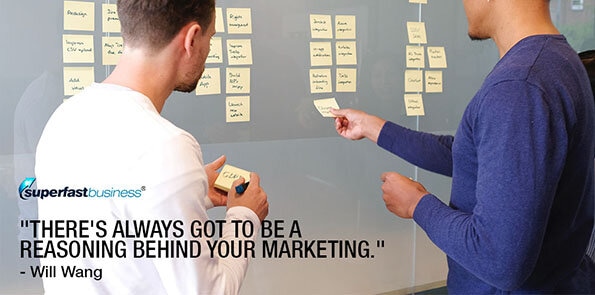You've probably heard the saying, "show don't tell". Case studies do just that - they show off your work and make prospects want what you have. That makes them a terrific marketing tool.
Today Growth Labz's Will Wang goes into the what, why, who and how of case studies. If you're looking to increase your sales in an effective, non-pushy way, this episode is for you.
Podcast: Download (Duration: 31:43 — 29.2MB)
Get Notified Of Future Episodes Apple Podcasts | Spotify | Amazon Music | Android | Blubrry | Gaana | TuneIn | Deezer | Anghami | RSS | More
In the podcast:
02:07 – What actually is a case study? Our cohosts define the subject and its role in marketing.
03:38 – The stories you don’t ask for. Sometimes the unsolicited cases are the best.
05:22 – What you’ll learn today about case studies. Will sets expectations with a quick topic run-through.
06:18 – Who benefits from these stories. Are case studies for anyone to use?
08:24 – When you haven’t got case studies. Everyone has to start somewhere…
09:51 – How to approach people for a study. Do you just ask people for their stories?
13:40 – The threat of copycats. Yes, this does happen.
15:26 – Is it okay to trade something for a study? Will and James offer their stances.
18:06 – Inside the creation of a case study. Will shares a process and a case study format he likes to use.
23:26 – Where to use those case studies. You’ve got them – now where do you put them?
26:11 – The classic cold case study outreach. It’s somewhat more difficult, but it works.
28:23 – Selling without having to sell. This is one of the best things about a case study.
Leverage the most impactful marketing tools with James’s help
Today’s podcast episode covers a highly, highly effective marketing technique. And for that, James has called on a highly effective marketer to share his expertise.
Will Wang of Growth Labz is a familiar guest, but none the less liked for it, because of the value he always delivers. He and James have talked about cold outreach, copywriting, artificial intelligence, and case studies of marketing campaigns he’s run.
Today, they chat again, but in a more general way, about case studies. James is a big believer in them, having case studies on his sales page, around his checkout cart, in his membership, and in many, many episodes of this podcast.
What actually is a case study?
A good way to kick off the discussion is with a case study definition.
Will sees a case study as presenting a story about a business or a product that doesn’t come from you telling it yourself. It’s a really good way, he says, of getting someone else to say how great you or your product is, and having their story behind it in a way that your ideal clients would relate to.
It’s much more impactful to have a third party vouch for your merits than for you to tell the world ourselves how awesome you are.
“A case study is a story from someone who has had a transformation.”
The interesting thing, says James, is that Will uses the word story. He’s saying a case study is a story from someone who has had a transformation. They’ve had a transformation using your product or service, and you’ve been able to document it, in hopefully a journalistic rather than a sales and marketing fashion.
The stories you don’t ask for
James loves, especially, when a story is unsolicited. He has plenty in his inbox.
One of them starts out with, I’m ready to share my case study on your podcast. They ran across James when they had nothing, listened to his podcasts and acted on them. They bought his entry-level products, acted on those, got results. They bought the software he recommended (10XPRO), and got more results. They’re now financially independent and enjoying life. James was like their liberator, and they now want to tell everyone about it.
That naturally excites James, and he has a feeling the story can be very motivating to someone in that person’s former position. It takes people on a journey, much as Will discussed in their previous episode together. Someone can place themselves in that person’s shoes and think, I could do that.
What you’ll learn today about case studies
So what about case studies will Will be discussing today?
He could share a bit, he says, about the types of businesses that should be using case studies, and how to get people to volunteer their stories. Then, how to actually get a case study done – What do you say? How do you ask the question? How do you write it up? That’s something he thinks they can break down from end to end.
If you like what you hear, by the way, and you’d like help with case studies, Will does that for people. You can send him an email at [email protected].
Who benefits from these stories
One of the reasons Will loves case studies relates to the example James gave. For someone listening to James now, the gap might be too wide to bridge – he’s been doing his thing for over a decade; he has experience and a network.
If someone says, however, that they started with nothing, and followed James’s advice and teachings to achieve success, that’s much more relatable.
Case studies, says Will, are also good for businesses with a very competitive market. Online coaching is one such space, with a lot of questionable intel being peddled as well. So it’s good to get real case studies, and a lot of them.
Another business type that Will thinks can really benefit is those with complicated products, products where it isn’t immediately obvious what they do. You’re not selling a widget or a shoe, but a product or a service or piece of software that takes a bit of thinking around what benefit it can provide to your customers.
For those businesses, case studies are so powerful because they give the time and the space, and talk about the end result of what the product actually does, skipping through all the features and going straight to the benefits, spoken from someone else’s point of view.
“If you sell something complicated, make it sound simple. And if you sell something simple, make it sound complicated.”
It’s a classic copywriting maxim, says James. If you sell something complicated, make it sound simple. And if you sell something simple, make it sound complicated.
And Will said, have a lot of case studies. James recalls Jay Abraham at one point had an entire eBook stuffed full with thousands of testimonials, although a testimonial differs somewhat from a case study.
When you haven’t got case studies
James is reminded of someone who’s looking at entering a new industry, and has zero case studies. He knows some people in that situation pick a story from the market and apply it to what they do. Almost every business book, for instance, talks about Steve Jobs, Bill Gates, Elon Musk or Jeff Bezos.
That’s interesting to him. But of course, nothing is more rewarding than your own case study, of someone who actually used your product and wants to share it.
That’s true, says Will. When they started their agency, they didn’t have case studies. They had to rely on studies of other companies who’d done what they were trying to do for their clients. But the moment you can have a case study about what you’ve actually done, it’s so much more powerful.
So use what you have. We’ve all got to start from somewhere. But do get yourself to where you have more assets and more case studies.
How to approach people for a study
How would you ask people if you can do a case study about them, asks James? He imagines some people might want to keep Will and his team a secret. It’s happened to him. But then other people might be happy to do it. What’s Will’s system?
There’s two ways of doing it, says Will, depending on the structure and processes you’ve got in your business. Some of their clients run a monthly NPS, which is net promoter score. And when they get nines and 10s, they have an automated email go out to the customer, expressing thanks and asking if they could record their response in a call and share it with the world. If they agree, they say, they’d love to give them something as a thank you.
That’s one side of it. Will and his team, in their case, are moving to a model where they do have NPS, but they work with not that many clients. They’re closely attached to our clients, and talk to them fairly often.
Every time they have a significant win, or something’s gone really well, they ask if it’s okay to share what they did with the rest of the world. Not to share how they did it, but share the story behind how the process came to be. They don’t share the secrets, just the wins and the story behind them.
Some of their clients would rather continue under the radar, and that’s fine, says Will. But more of them than you might expect are willing to share.
So James has found. He uses NPS and Nicereply. When someone responds with a 10 and adds comments, it’s easy to ask, Would you be willing to share that? They don’t offer a prize or the like, however, to avoid an incentivized case study.
He does think in his market lots of people would like to be on his podcast. So when he invites people to share their story on the show, it certainly gets interest.
The second thing is, in SuperFastBusiness membership, there’s a success thread. When someone posts a success, James might say, we should podcast about that. And often people would love to. Some are shy, or want to put it off till they’ve achieved more. And that’s fine as well, says James, there’s no pressure.
Another way James finds cases is when he knows people are consuming his information and they’re close on social messaging. He checks on them, and if they’ve had a win he might say, Let’s share that.
So there’s a number of ways you can get the case studies you need.
The threat of copycats
Some years back, James had a popular podcast with Sales Marketing Profit. They would take turns discussing a case study per episode from their clients. Sometimes they’d mention names and businesses; other times, they’d obfuscate them for privacy.
The need for confidentiality was a valid concern, because as James has experienced, and Will, too, likely, some people may want to simply copy and paste a strategy. Hence the need to protect their clients.
 That said, James thinks the bigger challenge most people have is not that they’re being copied, but that no one knows about them. Will, too, is of the mind that by the time you get to the point where you’re being copied, you’ve done something right. And there’s other ways of dealing with that.
That said, James thinks the bigger challenge most people have is not that they’re being copied, but that no one knows about them. Will, too, is of the mind that by the time you get to the point where you’re being copied, you’ve done something right. And there’s other ways of dealing with that.
James is right, though, he concedes. You don’t want to be giving up trade secrets in your case studies. That’s something he and his team are very, very conscious of. Their clients pay them to create unique campaigns, not to give everyone the secrets they pay them for.
Case studies are more about the story itself, and how you got to where you are, not necessarily every single step that you took to complete the journey.
Is it okay to trade something for a study?
What about when people offer something for a case study, asks James? A special rate, for instance? James himself is neutral on the topic. He can see that it might be good for everyone, but it could also be bad for someone, he’s not sure.
Will is generally not a huge fan of it. He knows it works in e-commerce, and if you’ve got the margin, why not go and get some user-generated case studies and content? But for an agency, his takeaway is that he wants honest opinion. He doesn’t want to influence customer feedback by offering a discount or the like. It’s not how they operate.
One thing they do, though, is send a thank you box after a case study is done.
James thinks that’s smart. It’s acknowledging the customer’s done something nice, and it isn’t something promised, not the reason they provided the case study.
Inside the creation of a case study
Will often gets asked how he actually puts a case study together.
James imagines there’s a framework.
As a side note, when he wanted case studies for his book, he had someone help create them. It saved him a lot of time that he could spend doing something else. So he wants listeners to know that the stuff they talk about today can be bought. They could pay Will and his team. Or they could try it themselves, depending on their budget and business size.
So when someone hires Will to make a case study, what’s the process?
Will has a case study format based around stories. The last podcast episode he and James did was all about stories. And this one is, in a sense, using stories in different format. Case studies written by people for themselves are generally boring. It’s all about them, how great they are. It lacks the juicy details, and it’s just not relatable or effective.
So Growth Labz’s process with their clients is, they look at the entire journey of their customers and how they started working together, but also some of the doubts and frustrations they had before they even came on board. So they make it all about the end client – their story, their journey and what they were struggling with. And also some of the things they were thinking about and objections about coming on board with Will’s clients.
They might say things like, I wasn’t sure because the budget was really high, and I didn’t know if I could afford it. Or they might say, I never used a service like this before, or There might be a million other services just like theirs, and I wasn’t sure if they would be the right one for me.
So Will builds relatability. He builds sales objections into the case study, and he builds the journey and the story of before and after and the frustrations along the way. He doesn’t detail the features, that’s not what the case study’s about. And he paints a picture of the end result, where the client’s ended up.
 That’s the framework and the process they go through. It’s similar to the framework discussed in his last episode with James, but shortened.
That’s the framework and the process they go through. It’s similar to the framework discussed in his last episode with James, but shortened.
James loves that it gets into the mind of someone who hasn’t purchased, but can see how it turned out well for someone who has.
Exactly, says Will. You don’t want to do a case study just for the sake of it. There’s always got to be a reasoning behind your marketing. And so the reasoning behind the case studies for most of Will’s clients and for himself is that they want more leads and more sales coming from this marketing activity.
 It’s like the demos James used to do at Mercedes-Benz, where they let people drive the vehicle. The case study is like a test drive. And hearing how someone else got on can give confidence, increase trust, and reduce the risk of a mistake. The fear of making a mistake stops people from buying. So a case study can be the difference between moving ahead or not.
It’s like the demos James used to do at Mercedes-Benz, where they let people drive the vehicle. The case study is like a test drive. And hearing how someone else got on can give confidence, increase trust, and reduce the risk of a mistake. The fear of making a mistake stops people from buying. So a case study can be the difference between moving ahead or not.
Where to use those case studies
The next part, says Will, is, where do we use case studies? And how do we promote them?
Everywhere, says James. He sells from his podcast because of case studies. It’s selling without selling, talking about things that have actually happened and inviting people to get the same results. You can put them in books, email sequences, podcasts, sales page, checkout page, videos. Likely Will has come up with other ways as well.
For Will, it’s a lead generation tool and a conversion tool at the same time. Typically, when they do campaigns, they have to split them out. They have campaigns where they’re just getting leads through, then they go to nurture, and then they go to convert. But case studies can do both. That’s why he loves them so much.
You can use them on the phone as well, says James.
The most obvious use, says Will, is running ads to case studies. Facebook ads, LinkedIn ads, Google Ads sometimes as well. What they’ve found is that it might be a bit more expensive to get leads to sign up, because they’ve got to watch this or read that, and it takes some time. But the lead quality when you put someone in front of a case study, versus just a lead magnet, is just night and day. Some of the best sales and clients his customers have got have come from putting a case study in front of a phone call. So that’s one way that they’re using it.
With case studies you can get your foot in the door with some really big companies that you typically wouldn’t get the time of day from. Will has seen them used across many different platforms in many interesting ways, both in terms of lead generation and conversion itself.
Selling without having to sell
Case studies are like Inception, says Will. It’s not like you’re trying to sell to people – they convince themselves to buy based on someone else’s story.
And James thinks it comes down to what you think selling means. It’s about creating the environment where the prospect can see for themselves that they will be better off for deciding to go forward with you. And a case study is almost the perfect way to do that.
A case study literally is documenting the journey someone’s already had. Will said it in the beginning of the show, it’s a story. If you can document success stories of people who’ve been down the track just like the prospect, then there’s a good chance that prospect will decide to come on board with you because they think they’ll be better off.
Where can you get your case studies?
Who can you pay to do a case study for you? Will and his team are doing it for clients at the moment, at James’s suggestion. It made so much sense, and they’ve had so much demand. So if you want help with case studies, they do it from end to end, including jumping on the phone and recording Zoom videos and doing the video editing.
Just reach out to Will at [email protected], and he’ll get you sorted with a case study of your own.
Access a trove of business resources and coaching inside JamesSchramko membership
Need an assist with your marketing? Look up Will at GrowthLabz.com
Enjoyed the show? Leave us a review on iTunes









Leave a Reply